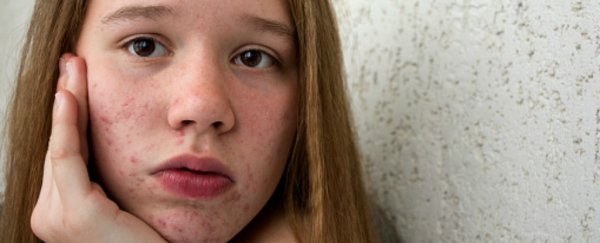Even though acne is nothing to be ashamed of, for some people it can be a self-esteem-crushing, bank-account-emptying experience - and nothing seems to help.
Now we finally have new hope, in the shape of the first-ever genetic study on acne. The researchers uncovered more gene markers for this condition than ever before, opening the door for potential new treatments.
Not only do the findings add weight to the idea that our proneness to acne can be written in our genes, they also reveal an unexpected culprit. It turns out that the genetics of hair follicles in particular could be leading to breakouts in some.
"In the last 20-30 years, there have been few advances in the way we treat acne, and the current main treatment has a number of significant side effects," says inflammatory disease researcher Jonathan Barker from King's College London.
"Applying these genetic approaches to acne has never been done before, and it's a significant leap forward. When you have insight into the genetic basis of a condition, you can develop much more effective treatments."
Barker and his team compared the genomes of nearly 27,000 people, including 5,602 with severe acne.
The genome-wide association study yielded a real bounty - the researchers pinpointed 15 regions of the genome that were linked to severe acne, 12 of which had never been implicated before.
And, strangely enough, many of these regions were also associated with the human hair follicle.
"It was surprising that so many of the variants appear to influence the structure and function of the hair follicle," says the study's senior author Michael Simpson, a researcher in genomic information at King's College London.
"It may be that the genetic variation influences the shape of these hair follicles and makes them more prone to bacteria and inflammation, which are a characteristic of acne."
In other words, the authors think that there may be some follicle shapes out there that trap bacteria and oils more easily, causing breakouts to occur more often and with greater severity.
The authors note in the study that there appear to be plenty of gene regions yet to be identified by future research, but this is a terrific step forward.
"A number of the genetic variants point to interesting mechanisms that could be really good targets for new drugs or treatments that would really help patients," adds Simpson.
And new targets for acne treatments are desperately needed. Today, one of the best treatments available for severe acne is isotretinoin (often known under the brand name Accutane), which works by reducing the amount of oil our skin produces.
But while this drug can be helpful to some, it doesn't work on every type of acne, and can come with some gnarly side effects, such as fatigue, dizziness, dry and scaly skin, joint pain, and even birth defects.
It's usually the last-ditch option for acne sufferers after they have spent plenty of money on other treatments, like topical creams, washes and hormonal pills, that are often poorly tolerated, ineffective and quite costly.
After that, we really don't have much else, leaving many people at a loss for what to do next. And if the condition persists for years on end, it can leave serious scarring in up to 20 percent of people with severe acne.
"For people with acne, it's so important to have more treatments available," says Barker.
"We need to treat people earlier and more effectively, so that they don't get scars, which last even after the condition has come and gone."
This study has been published in Nature Communications.
